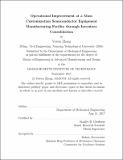| dc.contributor.advisor | Stanley B. Gershwin. | en_US |
| dc.contributor.author | Zhang, Yuwen, M. Eng. Massachusetts Institute of Technology | en_US |
| dc.contributor.other | Massachusetts Institute of Technology. Department of Mechanical Engineering. | en_US |
| dc.date.accessioned | 2018-02-16T19:27:28Z | |
| dc.date.available | 2018-02-16T19:27:28Z | |
| dc.date.copyright | 2017 | en_US |
| dc.date.issued | 2017 | en_US |
| dc.identifier.uri | http://hdl.handle.net/1721.1/113730 | |
| dc.description | Thesis: M. Eng. in Advanced Manufacturing and Design, Massachusetts Institute of Technology, Department of Mechanical Engineering, 2017. | en_US |
| dc.description | This electronic version was submitted by the student author. The certified thesis is available in the Institute Archives and Special Collections. | en_US |
| dc.description | Cataloged from student-submitted PDF version of thesis. | en_US |
| dc.description | Includes bibliographical references (page 77). | en_US |
| dc.description.abstract | This thesis addresses the operational improvement at Varian Semiconductor Equipment and Associates (Varian), a subsidiary of Applied Materials (AMAT), through material shortage reduction. Varian manufactures highly customized implantation equipment. Sub-assemblies that form an implantation tool are manufactured in the supermarket at Varian. The company is currently trying to increase the on-time delivery of sub-assemblies from the supermarket. Around 40% of sub-assemblies are delivered late to the tool production flow line or to the AMAT global parts banks and customers. This project focused on the improvement of supermarket on-time delivery. Impact analysis was conducted to assess the significance of the late delivery to the overall operation at Varian. Root causes of late delivery were identified through extensive data collection and three proposals were created: re-evaluation of inventory bin sizes, consolidation of inventory storage and assignment of priority based on real-time capacity. The second approach was further divided into two directions. This thesis emphasizes on one of the two directions, addressing the storage space required in the warehouse for inventory consolidation and the new material picking process. Various issues associated with the implementation were considered and solutions were proposed. Material shortages can be reduced by 64%, while pick-to-short kits are reduced by 50%. Supplier on-time delivery issues and purchase order placement should be investigated to further decrease material shortages. | en_US |
| dc.description.statementofresponsibility | by Yuwen Zhang. | en_US |
| dc.format.extent | 77 pages | en_US |
| dc.language.iso | eng | en_US |
| dc.publisher | Massachusetts Institute of Technology | en_US |
| dc.rights | MIT theses are protected by copyright. They may be viewed, downloaded, or printed from this source but further reproduction or distribution in any format is prohibited without written permission. | en_US |
| dc.rights.uri | http://dspace.mit.edu/handle/1721.1/7582 | en_US |
| dc.subject | Mechanical Engineering. | en_US |
| dc.title | Operational improvement at a mass customization semiconductor equipment manufacturing facility through inventory consolidation | en_US |
| dc.type | Thesis | en_US |
| dc.description.degree | M. Eng. in Advanced Manufacturing and Design | en_US |
| dc.contributor.department | Massachusetts Institute of Technology. Department of Mechanical Engineering | |
| dc.identifier.oclc | 1022283622 | en_US |
